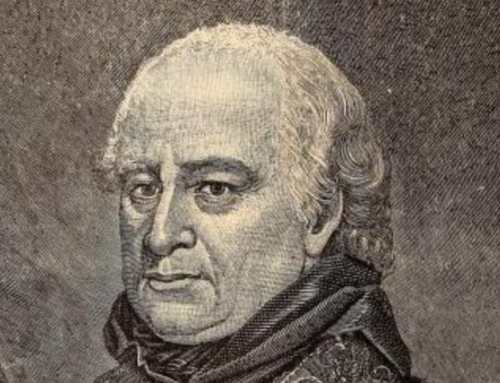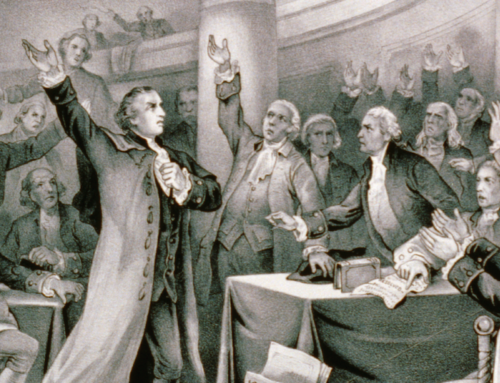
Two-hundred twenty three years ago today, the intriguing and rather historically complex and enticing West Indian and revolutionary artillerist, Alexander Hamilton, published the first of the eighty-five editorials explaining, defending, and promoting the newly written and submitted U.S. Constitution.
Published originally on the same day (today, that is, 1787) in four prominent New York newspapers, Federalist 1 revealed much—but by no means all—about the document so recently and contentiously formed in Philadelphia.
Still, at only 1,600 words, Hamilton’s letter—published under the Roman name of Publius (a pseudonym Hamilton had been using for years, especially in defense of Republican virtue against the irascible Sam Chase of Maryland)—hints at the brilliance of the document and the deliberations that produced it.
In his most recent book, America’s Beginnings: The Dramatic Events that Shaped a Nation’s Character (Roman and Littlefield, 2010), the ever interesting and up and coming author and historian, Tony Williams, writes:
The Federalist was written at the frenetic pace of nearly 1,000 words per day. There were usually two entries in each newspaper edition, overwhelming the opposition, the printers, and the authors. Hamilton and Madison were able to accomplish their Herculean writing task because of their extensive knowledge of ancient and modern history and political philosophy (pg. 167).
[Though this short piece isn’t meant to be a book review, I encourage any reader of the TIC to buy Tony’s new book as soon as possible. He’s a master of the colonial and revolutionary period, and I’ve thoroughly enjoyed everything I’ve read by him. Though I’ve only just received a copy of America’s Beginnings today, I’m certain I’ll assign it the next time I teach the American Founding; it’s brilliant. I also plan to devour it all in the next few days.]
As Hamilton made clear in the first Federalist Paper, opposition against the new Constitution would be fierce, mostly from those who stood to lose what power they had acquired since the revolution:
Among the most formidable of the obstacles which the new Constitution will have to encounter may readily be distinguished the obvious interest of a certain class of men in every State to resist all changes which may hazard a diminution of the power, emolument, and consequence of the offices they hold under the State establishments; and the perverted ambition of another class of men, who will either hope to aggrandize themselves by the confusions of their country, or will flatter themselves with fairer prospects of elevation from the subdivision of the empire into several partial confederacies than from its union under one government.
No one, of course, should take the Federalist Papers as some kind of ideological tract or the American equivalent of Das Capital. A systematic approach to the world simply can’t be found in them. This, to my mind, makes it even better than it would have been had it been presented as some uniform and coherent attempt at an explanation of government and humanity. While it’s certainly a sanitized version of Madison’s revealing and sometimes disturbing Notes on the Convention, the Federalist Papers reveal three men attempting—through intelligence, honesty, and force of conviction—to offer a framework, or a body, to protect and give permanence to the principles of the American Revolution, the “soul,” if you will, of the republic. Contradictions, tensions, and paradoxes exist in the Federalist Papers. While Hamilton’s writings present a consistent nationalism, Madison seems genuinely perplexed as to how federalism could exist in tension. Madison’s 10th and 39th don’t read as equals—at least in thought—to the same author’s 51st Federalist Paper. Honest and searching, Madison offers a nuanced view of the republic.
As the sixth president of the United States, John Quincy Adams, explained in April of 1839:
The nation fell into an atrophy. The Union languished to the point of death. A torpid numbness seized upon all its faculties. A chilling cold indifference crept from its extremities to the center. The system was about to dissolve in its own imbecility—impotence in negotiation abroad—domestic insurrection at home, were on the point of bearing to a dishonorable grave the proclamation of a government founded on the rights of man, when a convention of delegates from eleven of the thirteen states, with George Washington at their head, sent forth to the people, an act to be made their own, speaking in their name and in the first person, thus: “We the people of the United States, in order to form a more perfect union, establish justice, ensure domestic tranquility, provide for the common defence, promote the general welfare, and secure the blessings of liberty, to ourselves and our posterity, do ordain and establish this Constitution for the United States of America.” This act was the complement to the Declaration of Independence; founded upon the same principles, carrying them out into practical execution, and forming with it, one entire system of national government. The Declaration was a manifesto to the world of mankind, to justify the one confederated people, for the violent and voluntary severance of the ties of their allegiance, for the renunciation of their country, and for assuming a station themselves, among the potentates of the world—a self-constituted sovereign—a self-constituted country. In the history of the human race this had never been done before.
Still, in hindsight, it’s hard not to admit that the Articles of Confederation did several things quite well: the United States defeated Great Britain; no civil war occurred after the revolution (how rare this is); and the Congress passed unanimously the Northwest Ordinance of 1787, perhaps the most “republican law passed in the history of mankind,’ as our own John Willson has noted.”
And yet, the Constitution established something and protected something in the American character that the Articles never seemed to have done, a sense of permanence.
As Russell Kirk wrote in 1990, “And most of the time, during the two centuries since George Washington took his oath of office, the Constitution has succeeded as a restraint upon arbitrary power, rash innovation. . . . the American nation has prospered under a conservative constitution.” [Kirk, The Conservative Constitution, 3]
Two-hundred twenty three years ago today. . .
Books on the topic of this quotation may be found in The Imaginative Conservative Bookstore. The Imaginative Conservative applies the principle of appreciation to the discussion of culture and politics—we approach dialogue with magnanimity rather than with mere civility. Will you help us remain a refreshing oasis in the increasingly contentious arena of modern discourse? Please consider donating now.







This is my first writing, by the way, with the brand new MSWORD for Mac (Office 2011). Excellent and humane software, to be sure. Aesthetically pleasing screen, too.
Brad, I don't know the works of Mr. Williams, but I see that he will have a new work out in early 2011 – "The Jamestown Experiment." I was wondering, how do you think this new work will compare with Karen Ordahl Kupperman's "The Jamestown Project," which was positively reviewed by Professor Frohnen in Modern Age a couple of years ago? I travel with students to Jamestown, Williamsburg, and Monticello each year and, not being a specialist in early American history, would be very interested in your thoughts on readings on colonial and pre-revolutionary America. [BTW, I really enjoyed your C-Span lecture.]
Thanks, Glenn. I'll field your question. In the Jamestown Experiment, I examine the entrepreneurial origins of the Jamestown colony. I argue that the colony failed for its first decade because the military organization, harsh system of laws, common storehouse, and lack of private ownership of land were fundamentally at odds with the longings of human nature. It was only when the VA company introduced private property and self-government through the House of Burgesses did the colony begin to thrive. I live a mile from Jamestown and would be glad to tour around with you and your students next time! Thanks for your interest. [BTW, check out my C-SPAN lecture for Pox and the Covenant.]
Glenn and Tony, what a blessing to have you each as contributors to this site. Eager to see your next posts. –Brad
Might I add that I think the middle school students at your school studying U.S. History would benefit greatly from the book, Glenn.
Mr. Williams, Thanks for participating in this blog. It would be great to meet up with you in the spring. What is the best way to get in touch with you?
Glenn, please call me "Tony." E-mail Brad, and he is welcome to share my e-mail with you. Jamestown, Yorktown, Colonial Williamsburg – it's a great thing to live in the Historic Triangle. It would be a delight to meet up with you and an honor to join you and your students.